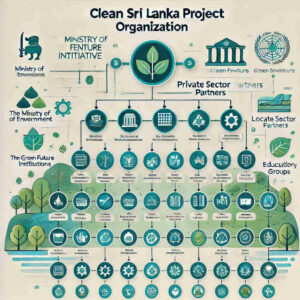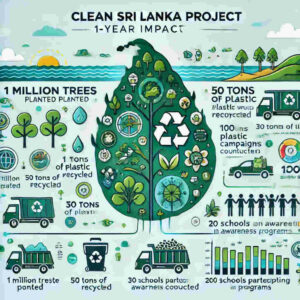What is the Clean Sri Lanka Project?
The Clean Sri Lanka Project is a nation wide concern addressing Sri Lankan need of present time environmental problems. Through waste minimization, encouraging sustainability, and the rejuvenation of the landscape, it seeks to engage national government departments, private companies, NGOs as well as local communities. Priority areas of interest include disposal and control of plastics, street littering, and preservation efforts.
Purpose of Establishment
The Clean Sri Lanka Project was initiated to effectively reduce the increasing rate of environment pollution. Country of beauty with greenery and long Sandy beaches of Sri Lanka suffers from problems like plastic pollution, poor waste disposal, and destruction of forests. The project’s primary goals include:
| Objective | Details |
|---|---|
| Reduce Waste | Strategies to minimize waste generation and improve recycling practices. |
| Raise Awareness | Educating the public on pollution’s adverse effects and sustainable living. |
| Protect Ecosystems | Conservation efforts to preserve biodiversity and habitats. |
| Promote Eco-Friendly Practices | Encouraging sustainable habits among businesses and individuals. |
| Enhance Community Participation | Empowering locals to take ownership through active involvement. |
Quiz: How Eco-Friendly Are You? 🌿
Answer the following questions to discover how eco-friendly your habits are and get tips to improve!
1. How often do you carry a reusable bag when shopping?
- A. Always
- B. Sometimes
- C. Rarely
2. Do you separate your waste for recycling?
- A. Yes, always
- B. Only for certain items
- C. No, I don’t
3. How often do you use public transportation, carpool, or cycle instead of driving?
- A. Frequently
- B. Occasionally
- C. Rarely or never
4. Do you avoid buying single-use plastics (e.g., bottles, straws)?
- A. Always
- B. Sometimes
- C. Rarely
5. How energy-efficient is your home?
- A. I use LED bulbs and energy-saving appliances
- B. I\u2019ve made a few upgrades
- C. Not energy-efficient at all
Results
Mostly A: 🌟 Eco-Warrior 🌟
You\u2019re a champion of sustainability! Keep inspiring others with your green habits. Consider getting involved in community clean-ups or sharing tips with friends.
Mostly B: 🌱 Green Starter 🌱
You\u2019re on the right track! Small changes, like always carrying reusable items or recycling more consistently, can make a big difference.
Mostly C: 🌍 Planet Learner 🌍
You\u2019re just getting started. Try swapping single-use plastics for reusables and separating your waste for recycling. Every step counts!
Leadership and Organizations Behind It
The Clean Sri Lanka Project is being launched by Ministry of Environment jointly with most popular NGOs and leading private sector organizations. Leaders of this association are Dr. Anuradha Jayasena, who is an outstanding environmental activist, and a dreamer of pollution free Sri Lanka.
Expert Quote:
“Our goal is not just to clean the environment but to create a sustainable framework where every citizen takes responsibility for their ecological footprint.” – Dr. Anuradha Jayasena

Key Highlights of the Project
Nationwide Participation:
Schools, universities, and community groups regularly engage in clean-up drives and awareness campaigns.
Plastic-Free Sri Lanka:
The initiative aims to phase out single-use plastics and promote biodegradable alternatives.
Technology-Driven Solutions:
The project employs advanced waste management systems and eco-friendly technologies.
Tree-Planting Campaigns:
Over one million trees are planted annually to restore deforested areas.
Youth Engagement:
Programs empower young leaders to actively participate in conservation efforts.
🌿 Clean Sri Lanka Project: Key Achievements 🌿
🌟 Waste Reduction:
- 50 Tons of plastic waste recycled this year.
- 30% reduction in single-use plastic consumption.
🌟 Reforestation Efforts:
- 1 Million Trees Planted across deforested areas.
- 10,000 Community Volunteers participated in tree-planting drives.
🌟 Community Engagement:
- 200 Schools and 100,000 Citizens actively involved in conservation activities.
FAQs
1. Yes, citizens can participate; but how can a common individual contribute all the same?
- Join clean-up campaigns.
- Reduce plastic usage.
- Adopt eco-friendly practices.
- Create an awareness on conservation of the environment.
2. Is there any volunteer services?
Yes! Either use the registration form through the organizations official website or ask local environmental organizations.
3. What are the long-term goals?
- The concept of a zero waste society.
- Rehabilitation of the slashed ecosystems.
- Constructing a nationwide living model in Sustainability.
4. How is the project funded?
They include government resources, private sponsorship, and funds from internationals organizations budgets.
5. What problems will the project encounter?
- Lack of knowledge on the part of the public.
- Few and inadequate facilities to deal with waste.
- Sustainability management policies: Force and resistance in some communities.
Here’s a comparative table showing Sri Lanka’s waste management progress alongside a few other countries:
| Country | Waste Generation per Capita (kg/year) | Recycling Rate (%) | Key Strategies | Challenges |
|---|---|---|---|---|
| Sri Lanka | 380 | 10 | Community clean-ups, plastic ban initiatives, composting. | Limited recycling infrastructure, lack of public awareness. |
| Germany | 615 | 67 | Strict waste separation laws, advanced recycling facilities. | High cost of advanced technology and operations. |
| Japan | 400 | 60 | Waste sorting, incineration with energy recovery. | Overreliance on incineration and limited landfill space. |
| India | 210 | 20 | Informal recycling sector, composting initiatives. | Unregulated waste disposal, lack of enforcement mechanisms. |
| USA | 800 | 35 | Single-stream recycling, landfill gas-to-energy programs. | High waste generation, contamination in recycling streams. |
Key Takeaways:
- Sri Lanka has lower waste generation than developed countries but struggles with recycling due to limited infrastructure.
- Countries like Germany and Japan lead in recycling efficiency thanks to robust systems and technological advancements.
- Challenges vary by country, with Sri Lanka needing improvements in public awareness and recycling capacity.
Call to Action
Join the Clean Sri Lanka Project today!
| Address | Clean Sri Lanka Office, Lotus Building, 150, R.A. de Mel Mawatha, Colombo 03 |
| contact@cleansrilanka.gov.lk | |
| Official Website | Clean Sri Lanka |
| Contact Page | Click Here |
| Donation | Donate Now |
| Join with Clean Sri Lanka | Join Now |
Conclusion
The Clean Sri Lanka Project is another novel concept that focus on environment protection and sustainability. This project is promoting sustainable development for Sri Lanka by opening participation to the public and embracing technological revolution and sustainable development.
Pull Quote: “Together, we can create a legacy of sustainability and ensure Sri Lanka’s natural beauty thrives for generations.”



